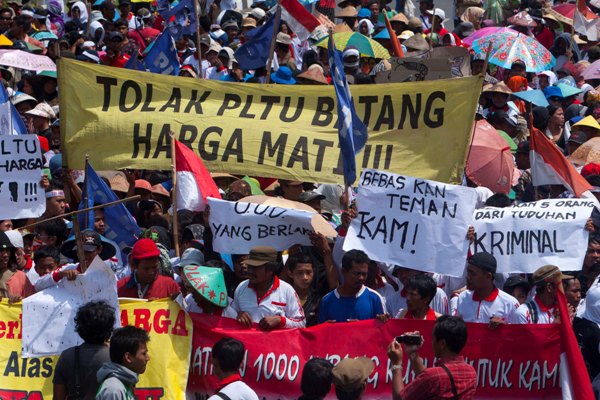Plant’s carbon emissions will top that of entire country of Myanmar and will threaten local livelihoods, environmental groups say.
Indonesia will go ahead with construction of what is set to be its largest coal-fired power plant in Batang, Central Java next year, a senior government official has said, downplaying opposition from environmental groups and the local community.
Developers have struggled to acquire the approximately 200 hectares of land needed for the planned PLTU Batang plant, which would have a 2000 megawatt (MW) capacity. Residents of five villages have protested the project, with some refusing to release their land on fears of potential environmental damage to the area. Environmental groups also oppose the plant, saying it overlaps with a marine protected area and runs counter to President Susilo Bambang Yudhoyono’s commitment to reduce carbon emissions.
“We have concluded that the land problem is just a small issue, so the groundbreaking will go forward in 2014,” Economic Minister Hatta Rajasa said in Jakarta on May 17, as quoted by merdeka.com.
However local residents and a legal aid organization claim the land acquisition process has been marred by intimidation and human rights abuses, and that PT Bhimasena Power Indonesia (BPI), the company which will carry out the project, is still far from securing the needed land, despite government statements to the contrary.
“Hundreds of thousands of residents from the five villages are still committed to oppose PLTU Batang. We maintain our ancestral land and we don’t want there to be environmental destruction in our area. And we reiterate that 70 percent of our land still belongs to us,” Roidhi, a resident of Karanggenang, one of the villages affected by the project, told Mongabay-Indonesia.

Protest against planned coal plant in Java. Photo by: Greenpeace/Indonesia.
Government officials have provided various conflicting figures on the amount of land needed for the project and the percentage that has already been acquired. Hatta has said the project will require a 192-hectare area, and that the company has already secured 187 hectares. However Lucy Eko Wuryanto, deputy minister for coordinating infrastructure and regional planning, said the company had acquired 186 of the 226 hectares the project will require.
“When you look at the data mentioned by Hatta Rajasa…and Lucy Eko Wuryanto it is very clear that the data mentioned is a mere claim. Each person is reporting different data,” said Wahyu Nandang Herawan, a staff member of Lembaga Bantuan Hukum (LBH) Semarang, a legal aid organization that has been working with the community.
“This is a dirty strategy they are using to make it seem as if they have already acquired large amounts of land and expect that the residents who have not yet sold their land are hooked to sell.”
In a media release sent to Mongabay-Indonesia, LBH Semarang also claimed that residents of the area continued to face intimidation by thugs as well as by police and members of the military, who were urging residents to sell their land.
Greenpeace Indonesia has also spoken out against the plant. In a press release on April 3, the group said the plant would release 10.8 million tons of carbon into the atmosphere, greater than the entire carbon emissions of Myanmar in 2009. The plant will also release 226 kg of mercury each year, the group said, and will overlap with the Ujungnegoro-Roban marine conservation area, polluting rich fishing waters and threatening the livelihoods of local fishermen.
“This attitude shows the reluctance of the government to stop the country’s addiction to coal, which is so high. Hatta Rajasa’s persistence to develop carbon-intensive power plants contradicts President SBY’s [Susilo Bambang Yudhoyono’s] commitment to reduce greenhouse gas emissions in Indonesia by 26 percent in the year 2020,” Greenpeace Indonesia’s climate and energy campaigner, Arif Fiyanto, told Mongabay-Indonesia.
Once completed, PLTU Batang is expected to be one of the largest coal plants in Southeast Asia. BPI, a joint venture with Japan’s J-Power Electric Power Development Co. and Itochu Corporation and the Indonesian coal miner Adaro Energy, will build the $4 million plant.
Related articles
Scientists capture one of the world’s rarest big cats on film (photos)

(05/21/2013) Less than a hundred kilometers from the bustling metropolis of Jakarta, scientists have captured incredible photos of one of the world’s most endangered big cats: the Javan leopard (Panthera pardus melas). Taken by a research project in Gunung Halimun-Salak National Park, the photos show the magnificent animal relaxing in dense primary rainforest. Scientists believe that fewer than 250 mature Javan leopard survive, and the population may be down to 100.
Top Indonesian official calls out misinformation in environmental campaign
(05/20/2013) Indonesia’s top REDD+ official confirmed there is no plan to open 1.2 million hectares of forest in Sumatra’s Aceh Province, calling into question numbers used by environmentalists in their bid to stop reclassification of the province’s forest land.
In landmark ruling, Indonesia’s indigenous people win right to millions of hectares of forest

(05/17/2013) In a landmark ruling, Indonesia’s Constitutional Court has invalidated the Indonesian government’s claim to millions of hectares of forest land, potentially giving indigenous and local communities the right to manage their customary forests, reports Mongabay-Indonesia. In a review of a 1999 forestry law, the court ruled that customary forests should not be classified as “State Forest Areas”. The move is significant because Indonesia’s central government has control over the country’s vast forest estate, effectively enabling agencies like the Ministry of Forestry to grant large concessions to companies for logging and plantations even if the area has been managed for generations by local people.
Analysis: Indonesia renews moratorium on logging, palm plantations
(05/16/2013) Indonesia’s President Susilo Bambang Yudhoyono made a bold and courageous decision this week to extend the country’s forest moratorium. With this decision, which aims to prevent new clearing of primary forests and peat lands for another two years, the government could help protect valuable forests and drive sustainable development.
(05/15/2013) An AVAAZ petition calling upon Indonesian officials to put a stop to a proposal to open tens of thousands of hectares of protected rainforest to mining, logging, and oil palm plantations has surpassed one million signatures.
Rhino populations in Sumatra, Borneo should be combined to save Sumatran rhino from extinction

(05/15/2013) A new study argues for treating endangered Sumatran populations in Borneo and Sumatra as ‘a single conservation unit’, lending academic support to a controversial proposal to move wild rhinos from Malaysia to Indonesia.
Indonesia officially extends forestry moratorium
(05/15/2013) The Indonesian government has officially extended its moratorium on new logging and plantation concessions in 65 million hectares of forests and peatlands for another two years. The move, which had been expected, was announced Wednesday by Indonesian President Susilo Bambang Yudhoyono.
Paper giant APRIL to restore peat forest in Sumatra, but green groups say it continues to deforest
(05/14/2013) Pulp and paper giant Asia Pacific Resources International Limited (APRIL) has launched a $7 million ecosystem restoration project to restore and protect over 20,000 hectares of peat forest in Indonesia’s Riau province, Mongabay-Indonesia reported last week.
Palm oil company violated RSPO standards, evicted from sustainability body
(05/13/2013) The Roundtable on Sustainable Palm Oil (RSPO) has evicted Indonesian palm oil giant Dutapalma Nusantara for violating key principles for sustainability.